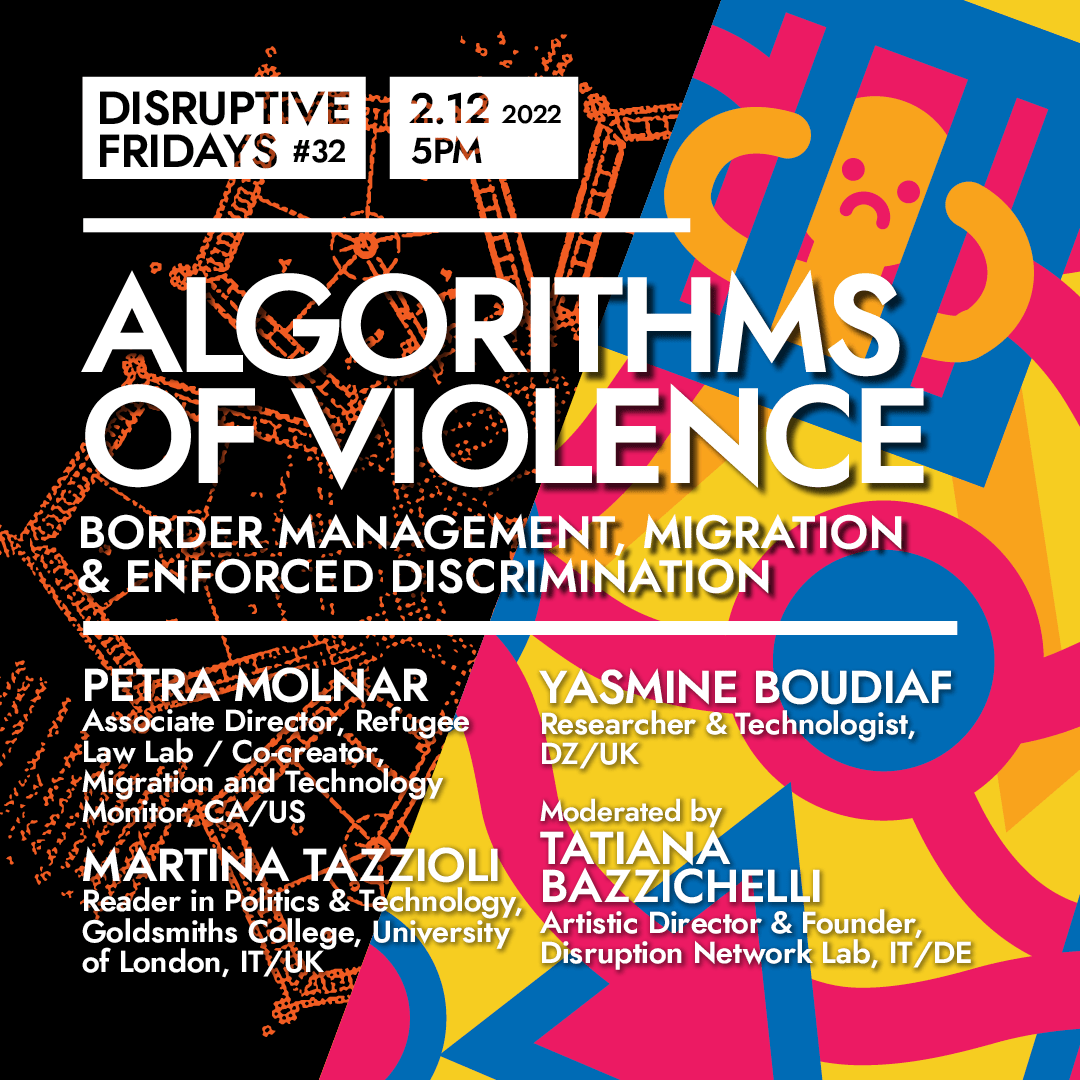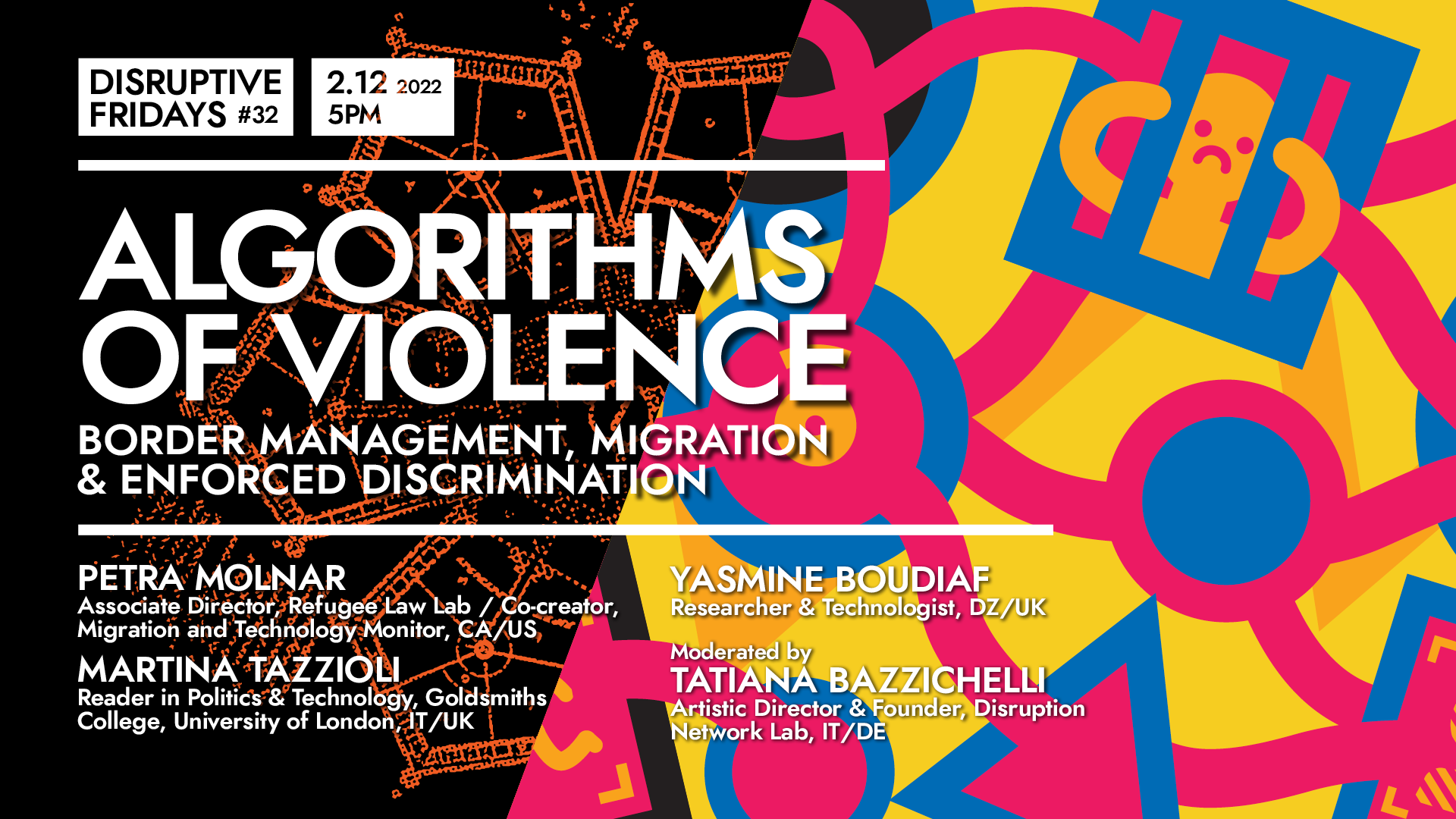Algorithms of Violence
Border Management, Migration & Enforced Discrimination
With Petra Molnar (Associate Director, Refugee Law Lab / Co-creator, Migration and Technology Monitor, CA/US), Martina Tazzioli (Reader in Politics & Technology, Goldsmiths College, University of London, IT/UK), Yasmine Boudiaf (Researcher & Technologist, DZ/UK). Moderated by Tatiana Bazzichelli (Artistic Director & Founder, Disruption Network Lab, IT/DE).
Live & online chat: https://www.disruptionlab.org/fridays
Surveillance and monitoring technologies including cameras, drones, biometrics, and motion sensors have been implemented to increase the use of AI-controlled surveillance and data collection systems in different domains, from migration management, asylum seeking, to borders control. The second Disruptive Fridays of the SMART PRISONS series, leading to the Disruption Network Lab’s conference on tracking, monitoring and control in the context of prison and detention systems (March 24-26, 2023), focuses on the topics of technological violence and enforced discrimination towards migrants and minoritised groups. We are witnessing a degeneration of the use of AI in sensitive contexts in Europe and globally. Who gets to ask questions about proposed innovations and why are perspectives from the ground up relegated to the margins?
In this panel, Petra Molnar focuses on technological violence through high-risk experiments at the border. Practices of border violence increasingly rely on high-risk technological experiments. Predictive analytics used for interdictions, AI-power lie detectors and powerful sound cannons are just some of the more recent tools that states, private entities, and even international organisations use to manage migration. Certain places like borders serve as testing grounds for new technologies, because regulation and oversight is limited and an ‘anything goes’ frontier attitude informs the development and deployment of surveillance and automation. A growing multi-billion dollar border industrial complex also underpins the development and deployment of high-risk new technologies. Based on work in Europe, East Africa, and the US-Mexico border since 2018, this presentation attempts to foreground the lived experiences of people on the move as they are interacting with the sharpest edges of experimental border technologies. The issues around emerging technologies in the management of migration are not just about the inherent use of technology but rather about how it is used and by whom, with states and private actors setting the stage for what is possible and which priorities matter.
Martina Tazzioli’s presentation, “Infrastructural Clashes”, deals with techno-humanitarianism in refugee camps by drawing attention to the apparent clash between, on the one hand, the implementation of high-tech technologies justified for both keep track of asylum seekers and protecting them, and on the other misfunctioning or insufficient basic infrastructures – such as electricity and running water. Building on research fieldwork conducted in Greece, it contends that, however, far from being a paradoxical clash, the coexistence between systematic misfunctioning infrastructures and use of security technologies enhances modes of uneven and discretionary control. In the second part, it conceptualises infrastructural clashes in camps from the point of view of modes of capitalisation over lives which "extract more from less” (Neilson, Rossiter, 2022), that is which extract value from a politics of induced scarcity. An insight into modes of uneven control strengthened through infrastructural clashes enable crafting a critique of encampments which exposes the modes of choking refugees' lives and the obstruction of their autonomous spaces of liveability in camps.
Yasmine Boudiaf's project "Entanglements“ interrogates the relationship between states and technology companies. These relationships are lawful, yet can perpetuate violence towards minoritised groups. It is therefore important when describing these relationships and their effects on people to move away from the potentially sanitising framing of legality vs. illegality and to focus on the harms the technologies can inflict. The systematic, often unnoticed and seemingly harmless harvesting of individuals' data is being weaponised against minoritiesd groups. Enabled through partnerships between government bodies and private technology companies, we have seen tech solutionism, normalising language, lack of consent and obfuscation as neo-colonial behaviours of these entities of power, designed to maintain and extend that power. The presentation touches cases from NHS (UK National Health Service) contracting, biometric surveillance of 'criminal migrants' to financial support for gas bills as a way to police migrants.
SPEAKERS
Petra Molnar (Associate Director, Refugee Law Lab / Co-creator, Migration and Technology Monitor, CA/US)
Petra Molnar is a lawyer and anthropologist specialising in technology, migration, and human rights. She is the Associate Director of the Refugee Law Lab at York University and runs the Migration and Technology Monitor (https://www.migrationtechmonitor.com), a multilingual archive of work interrogating technological experiments on people crossing borders. Petra is currently working on her first book, Artificial Borders: AI, Surveillance, and Border Tech Experiments (https://twitter.com/_PMolnar/status/1453410110689234945?s=20), and is a 2022-2023 Fellow at the Berkman Klein Centre for Internet & Society at Harvard University.
Martina Tazzioli (Reader in Politics & Technology, Goldsmiths College, University of London, IT/UK)
Martina Tazzioli is Reader in Politics & Technology at Goldsmiths College, University of London (https://www.gold.ac.uk/politics-and-international-relations/staff/tazzioli-martina). She is the author of The Making of Migration. The biopolitics of mobility at Europe’s borders (2019), Spaces of Governmentality: Autonomous Migration and the Arab Uprisings (2015) and co-author of Tunisia as a Revolutionised Space of Migration (2016). Her forthcoming book, "Border abolitionism: migration containment and the genealogies of struggles" (Manchester University Press) will come out in 2023. She is co-editor in chief of Politics Journal and on the editorial board of Political Geography- Open Research and of Radical Philosophy.
Yasmine Boudiaf (Researcher & Technologist, DZ/UK)
Yasmine Boudiaf is a researcher and creative technologist focusing on data, epistemology and the absurd. She was named one of 100 Brilliant Women in AI Ethics™ 2022. She produces art and research projects and consults on project design, strategy and public engagement. She is a fellow at the Ada Lovelace Institute and the Royal Society of Arts and is engaged in research and teaching at universities in the UK and Sweden.
https://yasmine-boudiaf.com
This Disruptive Friday is funded by Allianz Foundation, as part of the project “SMART PRISONS: Tracking, Monitoring & Control” (July 1, 2022, to June 20, 2023), curated by Tatiana Bazzichelli.



